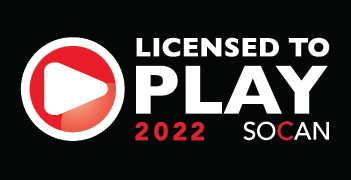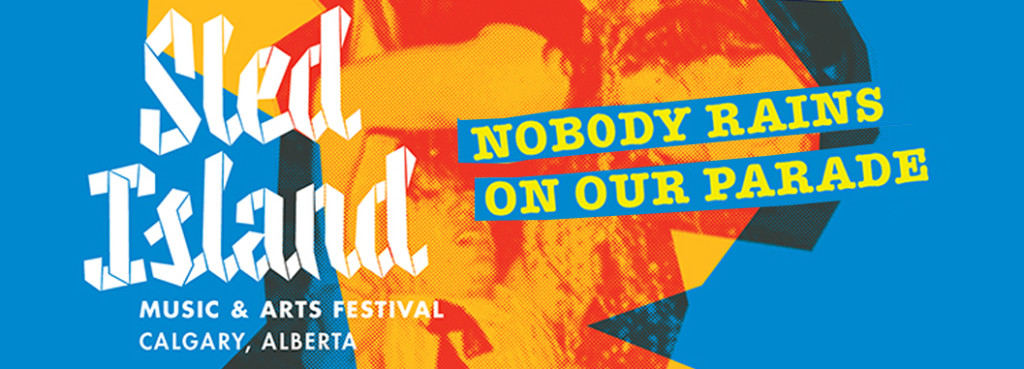
by Brendan Biddulph, host of Green Eggs & Ham (Wednesdays, 8-10am)As I drove through the rain between Saskatoon and Calgary, I couldn’t help but remember doing this same drive last year. The rains fell then too, Calgary was flooded, and Sled Island was cancelled. This year’s Sled slogan was “Nobody Rains On Our Parade.” Well it both rained and hailed this year. But CFCR’s own Jay “of Spades” Allen said “Don’t let a little rain get you down,” so I didn’t. I spent some time getting to know strangers huddled with me under tree branches. I put on a rain jacket. And I had an absolute blast.
For those of you in Saskatoon unfamiliar with Sled Island, think MoSo Fest on a bigger scale. Like any music festival, this one was full of tough choices. Often two bands you would love to see are playing simultaneously at separate venues, and you are forced to decide between them. Important choices also need to be made regarding transportation between the many venues in downtown Calgary. Walking is slow, running is tiring, biking is better — as temporary bike racks are placed outside of most venues. Many out-of-towners rented smart cars — available throughout the downtown core — to get between venues.
Much like MoSo Fest in Saskatoon, it is much better to see Sled Island with a festival pass. Many people hoping to buy individual show tickets went away disappointed. Fortunately Saskatoon ex-pats are the lifeblood Calgary, like Neil Malik who manages the Hifi Club. He cheered up more than one festivalgoer from Saskatoon by letting them into his venue after they had been turned away elsewhere.
The Polaris Prize long list was announced at the National Music Centre during Sled Island. One Saskatoon band made the cut — Shooting Guns with their most recent release Brotherhood of the Ram. They were among many other bands from Saskatoon to play at the festival, including The Moas, Powder Blue, Caves, economics and Slow Down, Molasses. As has become the norm at Sled Island, Saskatoon was well represented.
Now rather than list every band I saw during the festival, and every single thing I did — I thought you might rather read a more succinct “best of” list. Below you will find a list of the performances I caught and loved, in chronological order:
WEDNESDAY:
The Allovers
Bass Drum of Death
PS I Love you
THURSDAY:
The Shivas
Lab Coast
Tough Age
Chelsea Wolfe
FRIDAY:
Dead Ghosts
La Luz
economics
Maica Mia
SATURDAY:
Caves
Jung People
The Lad Mags
Shannon and the Clams
For further insight on a few of the bands in the above list, please see the interviews and concert reviews for Chelsea Wolfe, The Shivas, and La Luz below.
Chelsea Wolfe
[caption id="attachment_3056" align="alignnone" width="600"]
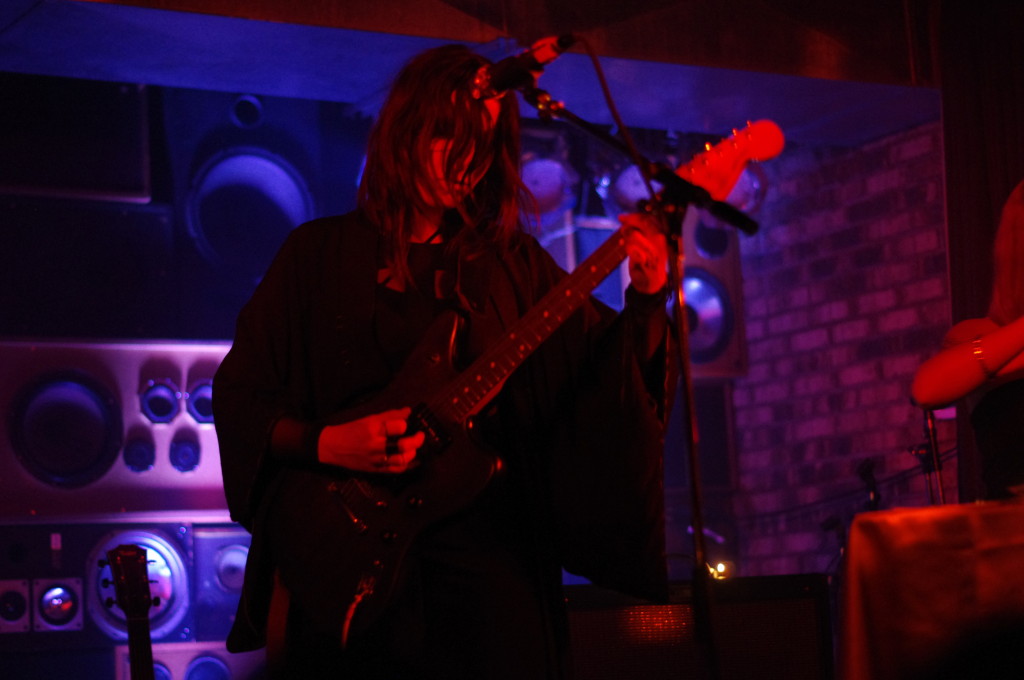 Chelsea Wolfe performing at The Commonwealth in Calgary, AB, Thursday, June 19, 2014.[/caption]
Chelsea Wolfe performing at The Commonwealth in Calgary, AB, Thursday, June 19, 2014.[/caption]I want flatlands
I want simplicity
I need your arms wrapped hard around me
I want open plains and scattered trees
I want flower fields
I want salty seas
I want flatlands’ soft and steady breeze
bringing scents of lined-up orchard trees
dripping heavy with pears and dancing leaves
I want flatlands
will you go there with me?
- Chelsea Wolfe — Flatlands (from Unknown Rooms: A Collection of Acoustic Songs)
Chelsea Wolfe is an artist that I’m not sure is completely understood. The dark subject matter of some of her lyrics, and the ominous tone created by some of her instrumentation, honestly don’t tell the whole story. The songs are often rescued by a bright chord emerging from the murky soundscape, or a lyrical glimmer of hope, or at the very least a merciful ambiguity. The almighty iTunes Editors’ notes on Chelsea Wolfe’s acoustic album, Unknown Rooms, describe her songwriting by inferring that “she isn’t writing songs so much as little horror films.” Well maybe, but if she is writing “little horror films,” she’s writing something more like The Sixth Sense than Saw.
Chelsea played a fantastic set at this year’s Sled Island Festival. Music festivals have many upsides, like the opportunity to fall in love with a band that you’ve never seen or heard of before. Festivals also have a few downsides, including the likelihood that you will end up watching a band you love along with a crowd of people who have never seen or heard of them before. This can make for an atmosphere somewhat beneath what a crowd of dedicated fans could offer. Chelsea played to a crowd overwhelmingly populated with passionate fans, along with a handful of people who had just happened to be hanging out at the Commonwealth Bar late on a Thursday night.
She created a beautiful atmosphere before even walking on stage. With candles lit, and Fratres for Strings and Percussion by Rudolf Werthen rumbling from the loudspeaker, she appeared with her bandmates Ben Chisolm and Andrea Calderon. They performed an excellent acoustic set, beginning with the first few tracks from her new album — Pain is Beauty. They moved through four heat-stopping cuts from Unknown Rooms: A Collection of Acoustic Songs, and rounded out their set with two more songs from Pain is Beauty, and then ultimately said goodbye with a Rudimentary Peni cover from her EP Prayer for the Unborn.
Chelsea was kind enough to sit down and chat with me the next day, an excerpt of which you can find below:
BRENDAN BIDDULPH: How did you feel about your show last night?
CHELSEA WOLFE: I felt like the audience was present, which was cool. I feel lucky to have an audience that is generally pretty chill, and that is there with me for the whole concert. So I got a little distracted at one point by some conversations in the audience. But overall I had a really great time, and I’m really happy to be here. I love coming to cities that I’ve never been to before. I really love coming up to Canada, partially because I don’t get to do it enough.
There were highlights during the set, where I was feeling great about everything. And there were low points. So emotionally it was a bit of an up and down experience over that one hour of set-time. I like my concerts to become an experience where people can just close their eyes and see what they see there, instead of me distracting them with a complicated stage set-up. So I was grateful to have a crowd that was really into it. I’d definitely like to come back.
BB: I’ve noticed that you make use of stillness and silence in your music. You seem comfortable with pauses, and you generally give your notes room to breathe.
CW: Yea, I like that space. It’s almost uncomfortable sometimes (which I like), for me and sometimes probably for the audience. Having that moment where you don’t know if a song has ended or not, and then it starts up again. I’ve always liked that space in songs, so I mess around with it. It’s something I experiment with, in a way.
I had lived in downtown LA for the last 3 ½ years, and recently I moved an hour outside of the city up into the mountains. And there’s nothing going on out there. There’s just the mountains, and hiking trails, and lots of birds. It’s totally different from Los Angeles. It’s still a bit of a struggle because I’m not used to it yet. I’m from Northern California, and I used to go camping at the nearby lakes, but I still lived in a city. So I’ve never lived in an area simply surrounded by woods before.
So it is something that I’m experimenting with, because I’m working on a new album, and I thought I’d try living there for a year to get away from everything that always distracts me. Not bad distractions, but there’s just always so much going on in Los Angeles, and so many things to do, meetings to be had and things like that. So I’m experimenting with stopping, and having nothing but that stillness, and just working within that.
When it comes to live shows, like this acoustic set, I definitely like to have to space there, and then try to bring people in with me. As I’ve performed the acoustic songs I’ve written — this is the second acoustic tour that I’ve done — I’ve decided that all I really want is for people to experience something real, and for me to be able to experience something real, and for us to be in it together. Because otherwise what would be the point of being on stage in front of people? It’s not something I’m naturally inclined to do. So since it’s my job, or whatever you want to call it, I want it to be a real emotional, raw experience for everyone.
BB: I may be unusual among your fans, but I find that your music makes me happy, and instills within me a sense of hope. Is that normal?
CW: The things I write about in my songs are usually a little heavy, or dark. But I usually try to inject a little hope into the songs. Whether it’s in the vibe of the melody, or occasionally a lyric that kind of saves everything. I usually try to bring a tiny bit of light. I like contrast in general. So I’m not really this dark person that’s just gothed-out all the time. I do believe that there’s a chance to overcome things, and I know that the world is full of some pretty difficult circumstances where I’m sure it’s difficult to see any hope. So I try to touch on that.
I’ve learned to be a fighter over the years, so I try to encourage that way of thinking too — that you can overcome even really dark situations. That’s what my most recent album is about: the fight to overcome things that life is going to continually bring you. Whether that’s the loss of a loved one, or a job, or your home being taken away, or whatever; you just have to keep fighting, and never give up.
BB: Could you tell me the story of how you came to play music?
CW: Well I ran from it for a long time. But it just kept pulling me back until I finally gave in.
I started making music when I was 9 years old on an 8-track recorder that my dad had at home. It was just something that was in my life, because my dad was doing it. As I got older I continued to write and record songs, but I never showed anyone because I just didn’t feel like I had it in me to be a performer. I never imagined that I would be doing music as a career.
When I graduated from high school I went straight into University. I studied English literature. And then from there I went to college in South Africa for a year. I was there working with street kids. Then I moved on to massage therapy school. I was obviously just running from what I really wanted to be doing. I was trying to find a path, but nothing was really calling to me.
Eventually I ended up staying in one place for a while — which was Sacramento, where I’m from. And enough people started encouraging me to play shows, so somehow I found a way to do it. I forced myself to do it. Honestly at first I had a lot of shows where I would just play like 3 songs, and I’d just be so uncomfortable up there that I’d have to leave. So it’s taken me a really long time to get to this point where I can just play and not run off stage. But I really think that it was calling me.
A real turning point was when my friend Steven asked me to come on a tour of performing artists with him. We mainly toured Europe. Steven is a folk artist, and he wanted me to come along as the resident musician in the group. At the end of each night I’d play an acoustic set. It was the bravest I had ever been with music. Sometimes I would have just written a song the night before, and I’d be playing it in front of these people. But they were pretty open, seeing as they were coming to these performance art shows. So they were really welcoming, and it was a comfortable place to do that.
I think the best part about the tour was that all of the performances were in these really weird spaces — like big old abandoned factories, and old churches that had been reconfigured into art spaces. They were all really reverby, and had very cool echoes. Hearing my voice in those spaces was kind of the guiding factor to the rest of my music. I came home from that trip and dusted off the old 8-track that my dad had taught me to record on when I was a kid. And I recorded my first real album: The Grime and the Glow. From there I went around to different spaces with my friends who were musicians, and I started writing songs on the fly. One of my favourite spaces was a parking garage beneath the apartment building I was living in. I would write down there a lot, because it was usually pretty quiet, and there was this huge reverb.
BB: So what advice would you give to someone thinking about making music their career?
CW: Mainly that it’s important to be yourself, and not follow what anyone else is doing musically, or any trends. What I’ve always been drawn to, in both art and in music,is honesty. I think it’s better just to do what you do, even if it’s weird, or you think that people won’t like it. Just start putting it out there.
The Shivas
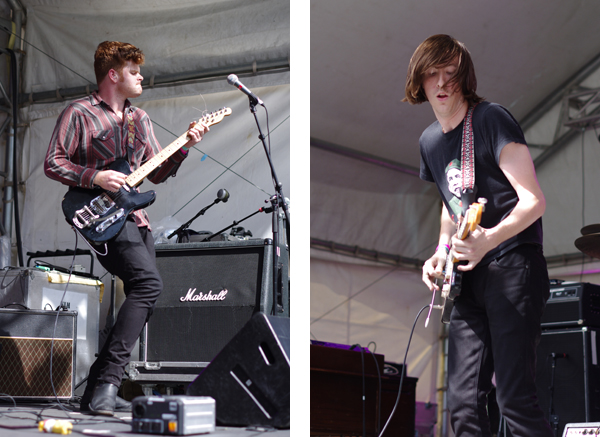
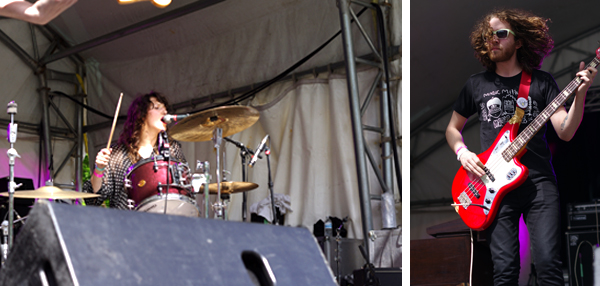
The Shivas (L-R): Rob Mannering (guitar), Jared Wait-Molyneux (guitar/lead vocals), Kristin Leonard (drums/vocals), Eric Shanafelt (bass).
The Shivas are a quartet from Portland. The band is composed of four friends (Jared, Rob, Eric, and Kristin) who formed The Shivas in high-school, at 15 years old, and have stuck together for 8 years since. They have been mistakenly billed as the Vishnus, and the Cheewas, and even been hassled by Canadian Customs on the way to Sled Island. But they seem to take it all in stride, and not to take themselves too seriously. They will continue their tour of North America in October/November of this year, and then set off on a European tour through December.
They agreed to meet with me atop the Calgary Tower in the Artist’s Lounge. I was caught of guard by how friendly and polite they were, you’d think they were Canadian — only nicer. They had a lot to tell me about The Simpsons, whose creator also hails from Portland. Did you know that Matt Groening and Elliott Smith went to the same high-school? Well The Shivas do, and they played a gig at that high-school.
They are currently signed to K Records out of Olympia, WA, the band is set to release their third album in October. Their first album was released only on cassette, called Freezing to Death. Initially their second album, WHITEOUT, was also a cassette-only release through Burger Records. Then came Calvin Johnson.
BRENDAN BIDDULPH: How did you come to record your new album through K Records, and why did Calvin Johnson decide to become personally involved in the recording process?
JARED: Well we’d previously played a few shows with Calvin, and we had a number of mutual friends. Recently we toured with him, as well as a few bands from our record label at the time (Burger Records): Tomorrow’s Tulips, The Memories, and Mom. The tour ended at an annual festival put on by K Records called the Helsing Junction Sleepover. After our set, Calvin asked if he could release our album WHITEOUT on vinyl through K Records. We were happy to say yes, and the conversation just sort of snowballed into talking about recording together.
So we recorded our new 7” (single, You Make Me Want to Die) with him, and at the same time we were recording our new full-length album. It’s due out in October, in time for the North American tour.
BB: How was recording with Calvin different than your previous recording experiences?
ERIC: It’s the first time we’ve recorded totally analog with no computers involved whatsoever. It was recorded and mixed entirely on tape. You play the songs into this crazy machine and it sounds really cool. You don’t overthink things. It’s just really natural and a lot of fun.
KRISTIN: He’s like a mad scientist. As soon as he enters the studio he puts on a white lab coat. He works in a white lab coat and jean shorts.
ROB: He’s super laid back, easy to get along with. He knows exactly what he’s doing. He’ll do whatever you want. He just wants to capture the band being themselves, and he’s willing to try anything you want to accomplish that. He’s interested in breaking the rules, and trying new things.
JARED: Working with him was a blast. He was hilarious. He’s been recording there for decades. He started K Records in 1981. In 1979-80 digital recording started becoming more widespread. All the analog equipment, tube microphones, and tape machines were going out of style because everyone wanted to do this new digital thing. All this old analog stuff was being sold for pennies on the dollar. Calvin had the foresight to see that this was the good stuff, and it was cheap, so he went around and bought it all up. So they built this studio with all this old vintage gear for next to nothing. The only downside is that because it’s so old, it’s all constantly breaking. So K Records employs 2-3 people whose sole job is to keep studio running. But Calvin is really good at fixing it himself, on the fly. It was amazing to see him at work.
BB: So you were all friends first, and a band second?
ERIC: Absolutely.
JARED: Yea, our approach hasn’t necessarily been to find a good guitar player, or whatever, but to find good people that want to do this thing, and that have the spirit, and then to just figure out the rest as we go. Growing up together made all that easier, because we knew each other in a pretty intimate way, and so this project has been easy to mold. It happened very naturally.
ROB: I think we all had to transform as artists to grow into the band. Kristin was a vocalist who learned to play the drums. Eric was a percussionist who learned to play the bass. I was a bass player who learned to play the guitar. I think that gives us something extra that we can contribute to the band as a result. Being friends has helped us support each other in that process.
KRISTIN: I think we’ve given meaning to the band name by what we’ve done as a band. And it makes it so much more fun travelling and doing this whole thing with your friends. This is the most fun I’ve ever had, travelling with these guys.
[editor’s note: Shiva is a Hindu deity, regarded among other things as the Transformer. Shiva is also the patron god of yoga and the arts]
BB: What advice would you give to a group of kids looking to start a band and succeed in the music business?
KRISTIN: Keep going. If you believe and you work hard enough, it’ll happen. It might take 10 years, but it’ll happen, just keep going. And be good to everyone, always be nice, never burn your bridges. And don’t tell people to dance. It’s uncomfortable If they want to dance they’ll just do it. You’ve gotta work for it. You can’t just tell people to enjoy your music, you’ve got to make them enjoy it.
Oh, and definitely encourage everybody to make music. Just because you never took lessons, or no one ever told you that you can play music, you can still do it.
JARED: Even if people have told you explicitly that you cannot play music, if people tell you that you suck, that’s doesn’t mean you can’t play music. You don’t have to be the best musician, you pretty much just have to be the best at being you.
For example, my brother is an athlete. My dad says that he’s lucky that at least in what he does there’s a clear-cut winner. Someone crosses the finish line first. So you can make money doing that if you’re the best. But if you’re the best at music, people don’t necessarily know that. But what I always say back to him is that I think of that as an advantage for us musicians, because you don’t have to be the best. You just have to be the best at doing your own thing. And then you just have to find the people that dig it. And that’s all there is to it.
ERIC: It’s a business that’s about building relationships, so give everyone the benefit of the doubt. Try to make connections, because those connections are your most direct path to enjoying what you’re doing, and to success.
Also originality. The best way to be original is to not come from some school or discipline where there’s a set way of doing things. It’s just to kind of figure it out and do what you do. Originality is one of the few things you have in rock & roll.
ROB: And good hair. Good hair and originality are important.
Also I don’t like how common it is for bands to say that they have two songs left. We don’t do that. People will know when the set is over, I promise. The music will stop.
But seriously, there’s no formula for it. We’ve played shows in front of thousands of people and I’ve not felt great about it. And we’ve played shows in front of four people, and I’ve felt awesome after. It’s a mercurial thing.
Success has more to it than being technically proficient. It really boils down to being creative. I just like to see bands enjoying themselves, and not being stressed out on stage, or freaking out about the monitor mix, or complaining about how nobody is dancing. The audience is looking to the stage for directions, not the other way around.
JARED: I’d also say don’t get bummed out. You never know who’s in the 5-person audience. All you can do is the best you can. Just do it, and just keep doing it. Do everything you can to make it happen and never stop making it happen. That’s the only way it’s ever going to happen.
La Luz
[caption id="attachment_3063" align="alignnone" width="600"]
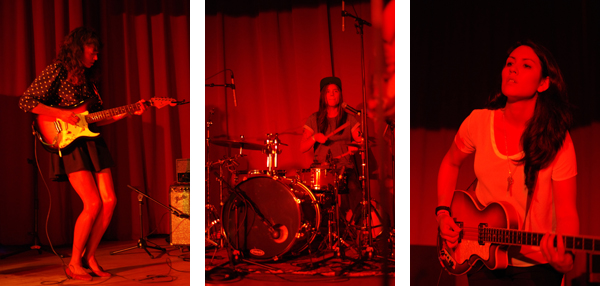 La Luz (L-R): Shana Cleveland (guitar/vocals), Marian Li Pino (drums/vocals) & Lena Simon (bass/vocals).[/caption]
La Luz (L-R): Shana Cleveland (guitar/vocals), Marian Li Pino (drums/vocals) & Lena Simon (bass/vocals).[/caption]La Luz is Shana Cleveland (guitar, lead vocals), Lena Simon (bass, vocals), Marian Li Pino (drums, vocals), and an imaginary keys player they call Alice Sandahl (they said she was at a wedding, and that’s why I couldn’t see her). They are a surf rock band from Seattle with coordinated dance moves, killer vocal harmonies, and an on-stage chemistry to rival the best. They were kind enough to sit down and chat with me in their hotel lobby.
BRENDAN BIDDULPH: Tell me about your relationship with The Shivas.
SHANA: I first saw them play years ago in a bar called The Comet in Seattle — that was about a year before we started this band. Seeing them was part of what inspired me to start this band, actually. I just thought it was so fun. I loved that I could dance to it, and it was still garage.
I really like their vocal harmonies, along with their mix of early rock & roll with contemporary garage. There are so few bands that can pull off a believable mix of early rock and slow ballads, but they do it so well.
BB: Who are some of the bands you consider your contemporary influences?
SHANA: The Shivas, Shannon and the Clams, The Growlers, Ty Segall. Those are the big ones.
BB: What inspired the band name?
MARIAN: Shana just saw it on the side of a church. She ran it by us, and we were like, 'yeah!'
SHANA: I thought it sounded pretty good.
LENA: Was it easy to think of that? Or was it a process?
SHANA: Oh definitely a process. I just wanted to avoid puns. And we had already decided that we didn’t want a play on words, or an animal name, or a big pretentious name. The name La Luz seemed simple, and it also sort of sounds like a surf band. Also I like alliteration, so it checked all the boxes.
BB: Do you have guiding principles as a band?
MARIAN: A lot of things we do as a band start out as a joke. Then we decide to just to just try it and see what happens. And then somehow they turn in to things that we actually do. It’s a mysterious process, really.
SHANA: There’s not a lot of forethought or planning involved. Things happen a little more naturally that way. You just have to do what feels natural. We never wanted to put on a staged, gimmicky show. I’ve seen a lot of bands perform on more than one occasion, and they’ll come out with a lot of the same stage banter. It’s so weird and disappointing. I think that people are saavy and they’ll catch onto something that isn’t genuine.
LENA: It’s like watching the same stand up comic show two nights in an row and thinking “Aw, I thought you made that up for me.” We try to be more authentic and engaged than that.
BB: Do any dance battles ever break out among the band members?
MARIAN: Only between Alice and I. Alice has been watching videos on how to twerk, and she’s been showing us.. It’s funny. Honestly we don’t really have dance-offs, but we like to dance at shows with each other.
LENA: I like to joke that that’s how I got into this band actually [she joined back in February]. Well, before I was in the band, at their record release show they had a dance-off. And really I don’t like to dance in front of a lot of people, especially by myself or in a small group while everyone is watching me. But I just signed up because they made me. And I ended up continuing through all of the levels. The I found myself up on stage in the finals. I like to say that second place was a spot in the band.
MARIAN: She did the worm! Which was the big one for me. She did the worm last night at Shannon & the Clams as well. She and I made a pact that if she would do the worm, I would crowd surf. She’s great to have around.
BB: If you had to choose a job other than being a musician, what would it be?
MARIAN: Like my second dream job? I’d probably go pro in table tennis. It’s an inherent passion. I think you need to cultivate your inherent passion. Drums are my number one passion, and I’d say ping-pong is number three.
LENA: What’s number two? You can’t just skip number two!
MARIAN: I don’t know. Not ping-pong, it can’t be ping pong! There’s got to be something else I love more than ping pong. Like reading, or tacos. I do like tacos more than ping pong.
SHANA: I would like to just live out in the country, on a farm, and just live off the land. Probably somewhere in California, it’s my favourite place in the world.
BB: What are a few bands from Seattle you’d recommend?
- Rose Windows
- Tacocat
- Dude York
- Pony Time
- Chastity Belt
- THEESatisfaction
BB: What’s your favourite song to dance to?
MARIAN: Whitney Houston - "I Want to Dance With Somebody"
LENA: Recently I’ve been listening to a lot of MIA. I could dance to that for a long time. I just saw her at Sasquatch, and I danced.
SHANA: Wanda Jackson - "Funnel of Love"
BB: What advice would you give to a band that is just starting out?
SHANA: I would just tell them to not try to follow a trend. If they’re trying to become popular, I’d say it’s important not to think about what people are going to say. There’s so much lazy music journalism out there. So many people that write about music nowadays don’t really listen to it very often. Like they might listen to one song, or they might just look at a picture, or even just regurgitate a press release. Some just look at another review. It’s really easy to let their comments get inside your head.
So if you read a review, and it’s says your band is boring, or all your songs sound a certain way, or that you should be different. Just ignore it, and do whatever it is that feels most natural for you. The music business is a very mysterious business, and there’s no single formula for success. There’s no way to tell somebody how to do it right. Except to start by just trying to be yourself.
MARIAN: I agree. Do what feels natural and work really hard.
LENA: Work really hard and don’t take yourself too seriously. Have fun. But you do have to work hard too.
SHANA: That’s a huge part of it. Because a lot of bands ask themselves, why are we not getting anywhere? But they don’t tour, and they say that they think self-promotion is weird, and that they don’t want to do it. It’s true, it totally sucks. But you have to do a little bit. You have to at least let people know where they can find you. Those are really the only things that you have to do: let people know what’s going on, and work really hard.
All photos (c) 2014 Brendan Biddulph

